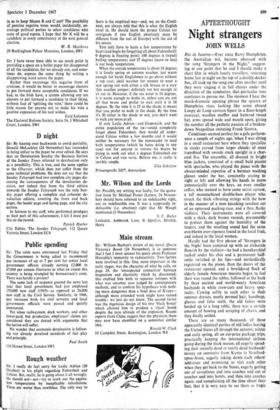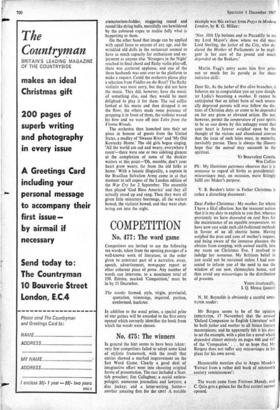Night strangers
AFTERTHOUGHT JOHN WELLS
Rio de Janeiro.—Ever since Barry Humphries, the Australian wit, became obsessed with the song 'Strangers in the Night," suggest- ing at one point that he and I should make a short film in which lonely travellers, returning home late at night on the top of a doulge-decker bus, all took up the song one after another until they were singing it in full chorus under the direction of the conductor, that particular tune continues to pursue me. The moment I hear the mock-dramatic opening phrase the spectre of Humphries rises, looking like some absurd Loopy de Loup cartoon figure in a floor-length overcoat, woollen muffler and battered tweed hat, arms spread wide and mouth open, giving the number all the pathetic passion of a broken- down Neapolitan imitating Frank Sinatra.
C,onditions.seemed perfect for a gala perform- ance a couple of nights ago, when I was sitting in a small restaurant here where they specialise in steaks carved from larger chunks of meat transfixed with swords stuck upright in a char- coal fire. The ensemble, all dressed in bright blue jackets, consisted of a small bald pianist with spectacles, who played the piano with the absent-minded expertise of a barman washing glasses under the bar, constantly staring to right or left and allowing his hands to move automatically over the keys, an even smaller cellist, who seemed to have some secret sorrow, a tall moustachioed double-bass player who struck the thick vibrating strings with the bow in the manner of a man knocking sawdust out of an upturned packing case, and a thin, flashy violinist. Their instruments were all covered with a thick, dark brown varnish, presumably, to protect them against the humidity of the tropics, and the resulting sound had the same overblown over-ripeness found in the local fruit, and indeed in the local women.
Hardly had the first phrase of 'Strangers in the Night' been conjured up with an elaborate flourish by the violinist—he had a handkerchief tucked under his chin and a permanent half- smile twitched at his lips—and methodically registered on the piano, than the doors of the restaurant opened, and a bewildered flock of elderly female American tourists began to feel their way round the tables, followed at the back by three ancient and world-weary American husbands in white crew-cuts and heavy spec- tacles. Cawing softly to each other in their summer dresses, neatly permed hair, handbags, glasses and false teeth, the old ladies were herded up to a long table, there was a certain amount of bowing and scraping of chairs, and they finally settled.
There are so many thousands of these apparently identical parties of old ladies leaving the United States all through the autumn, winter and early spring, all on cut-price package trips, practically keeping the international airlines -going during the slack season, all eagerly spend- ing their recently dead or nearly dead husbands' money on souvenirs from Kyoto to Stratford- upon-Avon, eagerly taking down each others' addresses and promising to visit each other when they get back to the States, eagerly getting out of aeroplanes and into coaches and out of coaches and into hotels, and then into coaches again, and complaining all the time about their feet, that it is very easy to see them as tragic crematorium-fodder, staggering round and round like dying bulls, mercifully too bewildered by the coloured capes to realise fully what is happening to them.
On the other hand that image can be applied with equal force to anyone of any age, and the wrinkled old dolls in the restaurant seemed to have as much capacity for enthusiasm and en- joyment as anyone else. 'Strangers in the Night' reached its final chord and flashy violin play-off, there was scattered applause, and one of the three husbands was sent over to the platform to make a request. Could the orchestra please play a selection from Fiddler on the Roof? The flashy violinist was most sorry, but they did not have the music. They did, however, have the music of something else, and they would be most delighted to play it for them. The sad cellist looked at his music and then dropped it on the floor, the others made some pretence of propping it in front of them, the violinist waved his bow and we were off into Tales from the Vienna Woods.
The orchestra then launched into their set piece in honour of guests from the United States, a medley of `Swanee River' and 'My Old Kentucky Home.' The old girls began singing. `All the world am sad and weary, everywhere I roam'—there were one or two sidelong glances at the complexion of some of the duskier waiters at this point—'0h, mumble, don't your heart grow weary, far from the old folks at home.' With a lunatic illogicality, a captain in the Brazilian Salvation Army came in at that moment to sell copies of the London edition of the War Cry for 2 September. The ensemble then played 'God Bless America' and they all actually stood up and sang. Then they were all given little miniature beermugs, all the waiters bowed, the violinist bowed, and they went chat- tering out into the night.



































 Previous page
Previous page